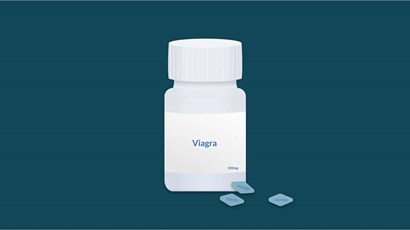Erectile Dysfunction Impotence
Erectile dysfunction (ED) means that you cannot get and/or maintain an erection. In some cases the penis becomes partly erect but not hard enough to have sex properly. In other cases, there is no swelling or fullness of the penis at all. Both can have a significant effect on your sex life. Erectile dysfunction is sometimes called impotence.
ED is usually treatable, most commonly by a tablet taken before sex. You may also receive lifestyle advice and treatments to minimise your risk of heart disease.
What causes erectile dysfunction?
Most men struggle to achieve or maintain an erection now and then. This can be due to:
- Being tired.
- Being stressed.
- Being distracted.
- Drinking too much alcohol.
For most men ED is only temporary, and an erection usually occurs when they are sexually aroused.
However, some men have persistent, or recurring ED problems. These cases are usually grouped into physical causes, or psychological causes.
Worried about erectile dysfunction?
Book a consultation with a local pharmacist today via Patient Access and discuss treatment options.
Physical causes of erectile dysfunction
About 8 in 10 cases of erectile dysfunction are due to a physical cause. These include:
- Reduced blood flow to the penis due to age.
- Nerve damage (eg, multiple sclerosis, stroke, Parkinson's disease).
- Nerve injury (eg, spinal injury, fractured pelvis, radiotherapy to the genital area).
- Diabetes.
- High blood pressure.
- Low testosterone levels.
- Side-effects of medications (eg, antidepressants, beta-blockers, diuretics, blood pressure medications).
- Alcohol and drug abuse (eg, heroin, cocaine, marijuana, steroids).
- Pressure on the nerves going to the penis - due to seated long-distance cycling.
- Venous leak.
Reduced blood flow to the penis is, by far, the most common cause of erectile dysfunction in men over the age of 40. Like in other parts of the body, the arteries which take blood to the penis can become narrowed. The blood flow may then not be enough to cause an erection.
Risk factors for narrowing of the arteries include getting older, high blood pressure, high cholesterol and smoking.
In most cases of ED due to physical causes (apart from injury or after surgery), the erectile dysfunction tends to develop slowly. So, you may have intermittent or partial ED for a while, which may gradually become worse. You are likely still to have a normal sex drive unless the cause is due to a hormonal problem.
For more information on how alcohol and drug abuse can cause ED, see the leaflets on Alcoholism and Problem Drinking and Medicines for Drug Dependence.
Psychological causes of erectile dysfunction
Various mental health conditions may cause you to develop ED. They include:
- Stress - for example, due to a difficult work or home situation.
- Anxiety.
- Relationship problems.
- Depression.
Typically, the erectile dysfunction develops quite suddenly if it is a symptom of a mental health problem. The erectile dysfunction may resolve when your mental state improves - for example, if your anxiety or depression eases.
However, some people become even more anxious or depressed when they develop erectile dysfunction, which creates a vicious cycle of worsening anxiety and persisting erectile dysfunction. This is typically the case with performance anxiety as well.
As a rule, a psychological cause for ED is more likely than a physical cause if there are times when you can get a good erection, even though most of the time you cannot. For example, if you can get an erection by masturbating, or wake up in the morning with an erection.
What you need to know before you take erectile dysfunction medication
You can now buy erectile dysfunction (ED) medication over the counter at pharmacies. However, so...
How common is erectile dysfunction?
ED is more common as you get older. About 50% of men between the ages of 40 and 70 have erectile dysfunction and about 70% of men aged 70 and above have erectile dysfunction. However, because many men don't seek medical help for ED, it is impossible to know exactly how common it is.
How is erectile dysfunction diagnosed?
Your GP will discuss the problem with you, go over any medication you may be taking, and do a physical examination. This can help to identify or rule out underlying causes for your ED.
Depending on your symptoms, likely cause of the ED, age, etc, your doctor may suggest that you have some tests These can include:
- A blood test to check the level of cholesterol and other fats (lipids).
- Blood sugar level.
- Blood tests to rule out kidney and liver disease.
- A urine test.
- A check of your blood pressure.
- A 'heart tracing' (electrocardiogram, or ECG).
- Other heart tests which are sometimes done, where appropriate, if heart disease is suspected.
If you have a low sex drive, or if you have had a previous head injury, ED may be due to a hormonal problem. In this situation a blood test to check the level of the hormone testosterone (and sometimes prolactin) may be advised.
In a small number of cases, tests to check the way the blood circulates through the penis, using scans or drug injections, may be done in hospital clinics.
Measuring the severity of erectile dysfunction
The severity of erectile dysfunction is measured on the basis of several factors:
- How you rate your confidence that you can get and keep an erection.
- How often your erections are hard enough for you to penetrate your partner following sexual stimulation.
- How often you can keep your erection after penetrating your partner.
- How hard it is for you to maintain your erection to complete sex.
- How often sexual activity is satisfactory for you.
The Sexual History Inventory for Men questionnaire (SHIM) questionnaire (see 'Further Reading' below) uses these questions to give an idea of whether your erectile dysfunction would be classed as mild, mild-moderate, moderate or severe.
Erectile dysfunction treatment
There is a good chance of success with ED treatment. The following gives a brief summary of the options:
Treating an underlying cause
For example, treating depression or anxiety, changing medication, or treating certain hormonal conditions may cure the associated erectile dysfunction.
Lifestyle and other advice
Lifestyle advice may help, such as losing weight if you are overweight, stopping smoking, taking regular exercise, and keeping alcohol drinking to within recommended limits.
As mentioned above, erectile dysfunction is often a marker that heart disease or other cardiovascular diseases may soon develop. Therefore, you should review your lifestyle to see if any changes can be made to minimise the risk of developing these problems.
Also, your doctor may prescribe a statin medicine to lower your blood cholesterol level if your risk of developing cardiovascular disease is high.
Counselling
Sometimes couple counselling, or sex therapy is useful. These are most useful if certain mental health (psychological) problems are the cause of, or the result of, erectile dysfunction.
In some cases, sex therapy is used in addition to another treatment option.
Tablets for erectile dysfunction
In the UK there are now four different ED tablets available:
You take a dose before you plan to have sex. They work by increasing the blood flow to your penis. They do this by affecting cGMP, the chemical involved in widening (dilating) the blood vessels when you are sexually aroused Because of the way they work, these medicines are called phosphodiesterase type 5 (PDE5) inhibitors.
Note: none of these tablets will cause an erection unless you are sexually aroused.
PDE5 medications work in 8 out of 10 cases. However, people on certain medications (such as those used to treat angina), or with certain conditions (such as high blood pressure), may not be able to take the above ED medications. Your doctor will advise.
Switching medications
Some medicines can cause erectile dysfunction. Check the leaflet that comes with any medication that you take to see if ED is a possible side-effect. Do not stop any prescribed medication but see your doctor if you suspect this to be the cause of your ED. A switch to a different medicine may be possible, depending on what the medicine is for.
If these ED tablets do not help then you will be offered referral to see a urology specialist for further assessment, advice and treatment. Treatment options that may then be offered include:
Cream applied to the penis
Topical alprostadil may be prescribed. The cream comes with a plunger. It is applied to the tip of the penis and the surrounding skin. It should be used 5 to 30 minutes before you have sex.
Injection treatment
This was the most common treatment before ED tablets became available. It usually works very well. You are taught how to inject a medicine into the base of the penis. This causes increased blood flow, following which an erection usually develops within 15 minutes. Unlike with tablets, the erection occurs whether of not you are sexually aroused.
Urethral medication
You can place a small pellet into the end of the tube which passes urine and opens at the end of the penis (the urethra). The pellet contains a similar medicine to that used for the injection treatment. The medicine is quickly absorbed into the penis to cause an erection, usually within 10-15 minutes.
Vacuum devices (pumps)
There are several different devices. Basically, you put your penis into a plastic container. A vacuum pump then sucks out the air from the container to create a vacuum. This causes blood to be drawn into the penis and cause an erection.
When erect, a rubber band is placed at the base of the penis to maintain the erection. The plastic container is then taken off the penis and the penis remains erect until the rubber band is removed (which must be removed within 30 minutes).
Penile implants
Penile implants can be permanently fit into the penis by a surgeon. The most sophisticated (expensive) type can be inflated with an inbuilt pump to cause an erection. The more basic type has to be straightened by hand.
Treatment for erectile dysfunction on the NHS
Sildenafil can be prescribed without restriction on the NHS.
Viagra®, tadalafil (Cialis®), vardenafil (Levitra®), and avanafil (Spedra®) are not prescribable on the NHS unless the prescription is endorsed 'Selective List Scheme' (SLS) and only if you have one of the following specific medical condition(s) or previous treatment(s):
- Diabetes, multiple sclerosis, Parkinson's disease, poliomyelitis, prostate cancer, severe pelvic injury, single-gene neurological disease (eg Huntington's disease), spina bifida, spinal cord injury, or severe pelvic injury.
- Dialysis or kidney transplant for end-stage kidney disease.
- Radical pelvic surgery or prostatectomy.
- Severe distress due to erectile dysfunction (needs to be diagnosed by a specialist who has ongoing responsibility for providing prescriptions).
Further reading and references
Erectile dysfunction; NICE CKS, July 2020 (UK access only).
A practical guide on the assessment and management of testosterone deficiency in adult men; British Society for Sexual Medicine (2017)
Sexual and Reproductive Health Guideline; Disorders of ejaculation chapter. European Association of Urology (EAU), 2022







